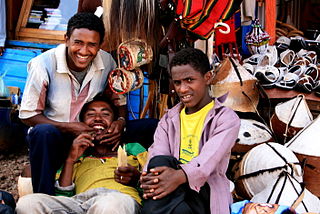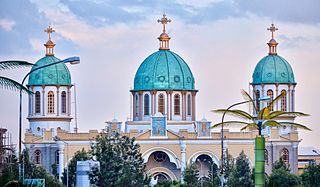List of musicians




The following is an alphabetical list of notable musicians using Amharic vocals in their musical compositions. The Amharic language is predominantly used in Ethiopia.




Amharic is an Ethiopian Semitic language, which is a subgrouping within the Semitic branch of the Afroasiatic languages. It is spoken as a first language by the Amharas, and also serves as a lingua franca for all other populations residing in major cities and towns in Ethiopia.
Ethiopian music is a term that can mean any music of Ethiopian origin, however, often it is applied to a genre, a distinct modal system that is pentatonic, with characteristically long intervals between some notes.

Amharas are a Semitic-speaking ethnic group which is indigenous to Ethiopia, traditionally inhabiting parts of the northwest Highlands of Ethiopia, particularly inhabiting the Amhara Region. According to the 2007 national census, Amharas numbered 19,867,817 individuals, comprising 26.9% of Ethiopia's population, and they are mostly Oriental Orthodox Christian.
P'ent'ay is an originally Amharic–Tigrinya language term for Pentecostal Christians. Today, the term refers to all Evangelical Protestant denominations and organisations in Ethiopian and Eritrean societies. Alternative terms include Ethiopian–Eritrean Evangelicalism or the Ethiopian–Eritrean Evangelical Church. Sometimes the denominations and organizations are known as Wenigēlawī.

Ethiopia is one of the few countries with so many traditional aspects and cultural mannerism. The country that is located in the horn of Africa has many traditions and cultures that is experienced in the daily livelihood of the people, starting of having their own calendar to the food, clothing, music and cuisine.

Yekatit 12, also known in Italy as the Addis Ababa massacre, is a date in the Ge'ez calendar which refers to the massacre and imprisonment of Ethiopians by the Italian occupation forces following an attempted assassination of Marshal Rodolfo Graziani, Marquis of Negele, Viceroy of Italian East Africa, on 19 February 1937. Graziani had led the Italian forces to victory over the Ethiopians in the Second Italian invasion of Ethiopia and was supreme governor of Italian East Africa. This has been described as the worst massacre in Ethiopian history.

Vahe Tilbian is an Ethiopian singer of Armenian descent. A solo artist, he became lead singer for the Ethiopian group Zemen Band. He released his debut solo album Mixology in 2012. He was part of the pan-Armenian music formation Genealogy who represented Armenia in Eurovision Song Contest 2015 with the song "Face the Shadow" finishing 16th overall.

LijSeifu Mikael was an Ethiopian noble, member of the Solomonic dynasty, belonging to the aristocratic Amhara family from Ankober Shewa. He was the grandson of Dejazmatch Mekuria Tesfaye of Menz, a prominent general, a cousin of Emperor Menelik II of Ethiopia, and grandson of King Sahle Selassie of Shewa. Lij Seifu, a public figure, was educated in Paris at the Sorbonne. He was one of the first few earlier members of the royalty who started paying salaries to their household servants advocating freedom of slaves and an avid supporter of Ras Tafari in his bid to become an emperor of Ethiopia. He served as Ethiopia's minister to France and Germany while he lived in Europe in the 1910s, Ethiopia's Consul General to Eritrea from 1921 to 1925 and Governor of several districts till the eve of the fascist invasion of Ethiopia.

During the Second Italo-Ethiopian War, the Italians captured and either imprisoned as prisoners of war or executed selected prominent Ethiopians. The majority of the public executions and mass incarcerations happened in the wake of the assassination attempt on Rodolfo Graziani. The Italian occupying force gave permission to the black shirts to murder educated Ethiopians, sparing only a few notables who were transported to various concentration camps maintained in the Harar region, Italian Somaliland, Eritrea and Italy. While the majority of prisoners who were kept at Asinara and other camps in Italy survived, tens of thousands of detainees perished under the severe conditions they were forced to live in. According to famous survivors like Ambassador Imru Zeleke, conditions were worse in Italian Somaliland camps due to the scarcity of food, water and medicine. According to Imru Zeleke, tens of thousands of Ethiopians died every year.

Zeritu Kebede is an Ethiopian singer, songwriter, and actress. A prominent figure in modern Ethiopian music, her songs often incorporate rock and gospel music.

Kebede Michael was an Ethiopian-born author of both fiction and non-fiction literature. He is widely regarded as one of the most prolific and versatile intellectuals of modern Ethiopia – he was a poet, playwright, essayist, translator, historian, novelist, philosopher, journalist, and government minister belonging to the Shewa Amhara nobility and member of the Solomonic dynasty. His maternal ancestor was King Sahle Selassie of Shewa.
Ethiopian historiography includes the ancient, medieval, early modern, and modern disciplines of recording the history of Ethiopia, including both native and foreign sources. The roots of Ethiopian historical writing can be traced back to the ancient Kingdom of Aksum. These early texts were written in either the Ethiopian Ge'ez script or the Greek alphabet, and included a variety of mediums such as manuscripts and epigraphic inscriptions on monumental stelae and obelisks documenting contemporary events. The writing of history became an established genre in Ethiopian literature during the early Solomonic dynasty (1270–1974). In this period, written histories were usually in the form of royal biographies and dynastic chronicles, supplemented by hagiographic literature and universal histories in the form of annals. Christian mythology became a linchpin of medieval Ethiopian historiography due to works such as the Orthodox Kebra Nagast. This reinforced the genealogical traditions of Ethiopia's Solomonic dynasty rulers, which asserted that they were descendants of Solomon, the legendary King of Israel.

Jano Band is an Ethiopian rock band formed by its entrepreneurs Ermyas Amelga, Bill Laswell and former manager Addis Gessesse in 2011. It versatilely mixes progressive rock with Ethiopian music. The band includes two female back and lead vocalists, two lead male vocalists, and four musicians who play bass guitar, rhythm guitar, drum, and keyboards.
The Institute of Ethiopian Studies(IES) was officially established in 1963 to collect information on Ethiopian civilization, its history, cultures, and languages. The Institute includes a research and publication unit, a library, and a museum. It is located at Addis Ababa University, Sidist (6) Kilo campus, which was at the time of the IES's opening, named Haile Selassie I University after the last emperor of Abyssinia.

Arba Minch General Hospital is a public hospital located in Arba Minch town, Ethiopia. It is one of the general hospitals in SNNPR region of Gamo Zone. It has a bed capacity for 200 patients.

The Soddo or Kistane are a subgroup of the Gurage who inhabit the south-central part of Ethiopia, considered the northern geographic and linguistic subset of the Gurage and speak the Soddo Gurage language or Kistanigna (ክስታንኛ). They primarily inhabit the Soddo (woreda) in the Gurage Zone, but large amounts also live in various parts of Ethiopia, particularly in Addis Abeba, Nazret, Butajira, and Dire Dawa. They are related to the Sebat Bet Gurage and other Gurage sub-groups, however, in contrast to the Sebat Bet Gurage and Silte, they are exclusively and almost entirely Ethiopian Orthodox Tewahedo Christians. The Soddo Gurage are known for and pride themselves on their Orthodox Christian identity, which they have historically practiced since ancient times, and from which their name Kistane derives its name from, as it is the traditional and preferred name by locals for the people, although Soddo is still popularly used.
The Ethiopian Golden Age of Music was an era of Ethiopian music that began around the 1960s to 1970s, until the Derg regime progressively diminished its presence through politically motivated persecutions and retributions against musicians and companies, which left many to self-imposed exile to North America and Europe. Several artists and musical companies, as well as recording groups, emerged to produce their own singles and albums; the first being Amha Records, and Philips Records, Ethiopia Records and Kaifa Records, which is primarily based in Addis Ababa.
{{cite book}}: CS1 maint: others (link)